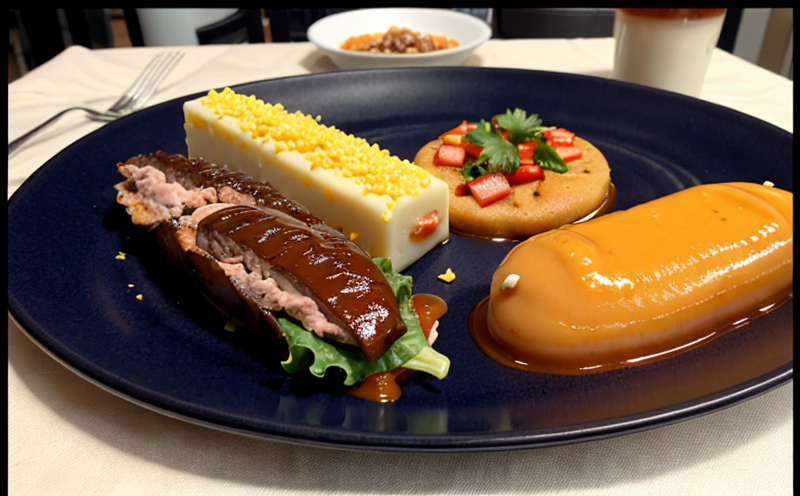EU 10/2011 Testing for Phthalates Migration
The EU Regulation (EC) No. 10/2011 on the use of certain plastic materials and substances in articles intended to come into contact with foodstuffs is a comprehensive framework aimed at ensuring the safety of packaging materials that may come into direct or indirect contact with food products. This regulation specifically targets phthalates, which are widely used as plasticizers in various types of packaging such as containers, bottles, and bags for food items.
Phthalates have been shown to migrate from packaging material into the foodstuffs under certain conditions. Their migration can pose potential health risks if they exceed permissible limits set by regulatory bodies like the European Food Safety Authority (EFSA). The EU 10/2011 regulation therefore mandates rigorous testing to ensure that phthalate levels in contact materials do not exceed these thresholds.
Our laboratory, Eurolab, offers specialized services for compliance with this directive. We employ state-of-the-art analytical techniques and follow stringent protocols designed to accurately measure the migration of phthalates into foodstuffs from packaging materials. This includes testing various types of plastic used in food packaging such as polyvinyl chloride (PVC), polyethylene terephthalate (PET), high-density polyethylene (HDPE), and others.
The testing process involves several key steps:
- Sample preparation: This step ensures that the packaging material is suitable for analysis. It includes cleaning, drying, and cutting the sample to standard dimensions.
- Migration simulation: In this stage, food simulants are used to simulate real-world conditions under which migration might occur. Different types of food simulants such as aqueous solutions or oils may be employed depending on the type of packaging material being tested.
- Extraction process: After simulating the migration environment, the extracted phthalates are separated from the food simulant using appropriate solvents and then analyzed.
- Analytical analysis: The final step involves quantifying the amount of phthalates present in the food simulants. We use advanced chromatographic methods such as High Performance Liquid Chromatography (HPLC) coupled with Mass Spectrometry (MS) for precise measurement.
Our laboratory adheres strictly to international standards including ISO/IEC 17025:2017, which ensures that our testing procedures are accurate and reliable. Additionally, we comply fully with EU Regulation 10/2011 ensuring that all results obtained meet the required safety criteria.
By providing comprehensive testing services for phthalate migration in accordance with EU Regulation 10/2011, Eurolab aims to help companies maintain compliance and protect public health. Our expertise not only ensures regulatory adherence but also supports continuous improvement of product quality and safety.
Benefits
- Ease in ensuring regulatory compliance with EU 10/2011 through expert testing services.
- Avoidance of costly recalls by identifying potential issues early in the production process.
- Enhanced reputation and market access for food packaging manufacturers who demonstrate adherence to stringent safety standards.
- Supports ongoing product development and innovation, ensuring that new materials are safe for use with foods.
Frequently Asked Questions
Eurolab Advantages
At Eurolab, we pride ourselves on offering unparalleled service excellence in our field. With a team of highly qualified professionals and advanced laboratory facilities, we are committed to delivering accurate, reliable results that meet the highest standards set by EU regulations.
- Expertise: Our staff consists of experts with extensive experience in food safety testing and regulatory compliance.
- Technology: Equipped with the latest analytical instruments, our laboratory ensures precise measurements and accurate data collection.
- Compliance: We strictly adhere to international standards including ISO/IEC 17025:2017, ensuring that all tests are conducted under controlled conditions.
- Support: Beyond just providing test results, Eurolab offers consultation services to help our clients understand their data and make informed decisions.
In summary, Eurolab stands out as the ideal partner for any company seeking reliable testing solutions that comply with EU 10/2011 regulations. Our commitment to quality and customer satisfaction is reflected in every aspect of our service delivery.
Quality and Reliability Assurance
Maintaining high standards of quality and reliability is crucial for Eurolab's reputation and success. We achieve this through rigorous internal controls, regular calibration of equipment, and continuous training of our staff.
- Rigorous Internal Controls: Our laboratories follow strict protocols to ensure consistent and accurate results across all tests.
- Regular Calibration: All instruments are regularly calibrated using certified reference materials to guarantee precision and accuracy.
- Continuous Training: We invest in the ongoing education of our staff to stay updated with the latest developments in analytical chemistry and regulatory compliance.
In addition, Eurolab participates in proficiency testing programs organized by recognized bodies. These programs help us validate our methods and ensure that we maintain a high level of performance consistently. By adhering to these stringent measures, Eurolab ensures that all clients receive trustworthy results they can rely on for decision-making purposes.





